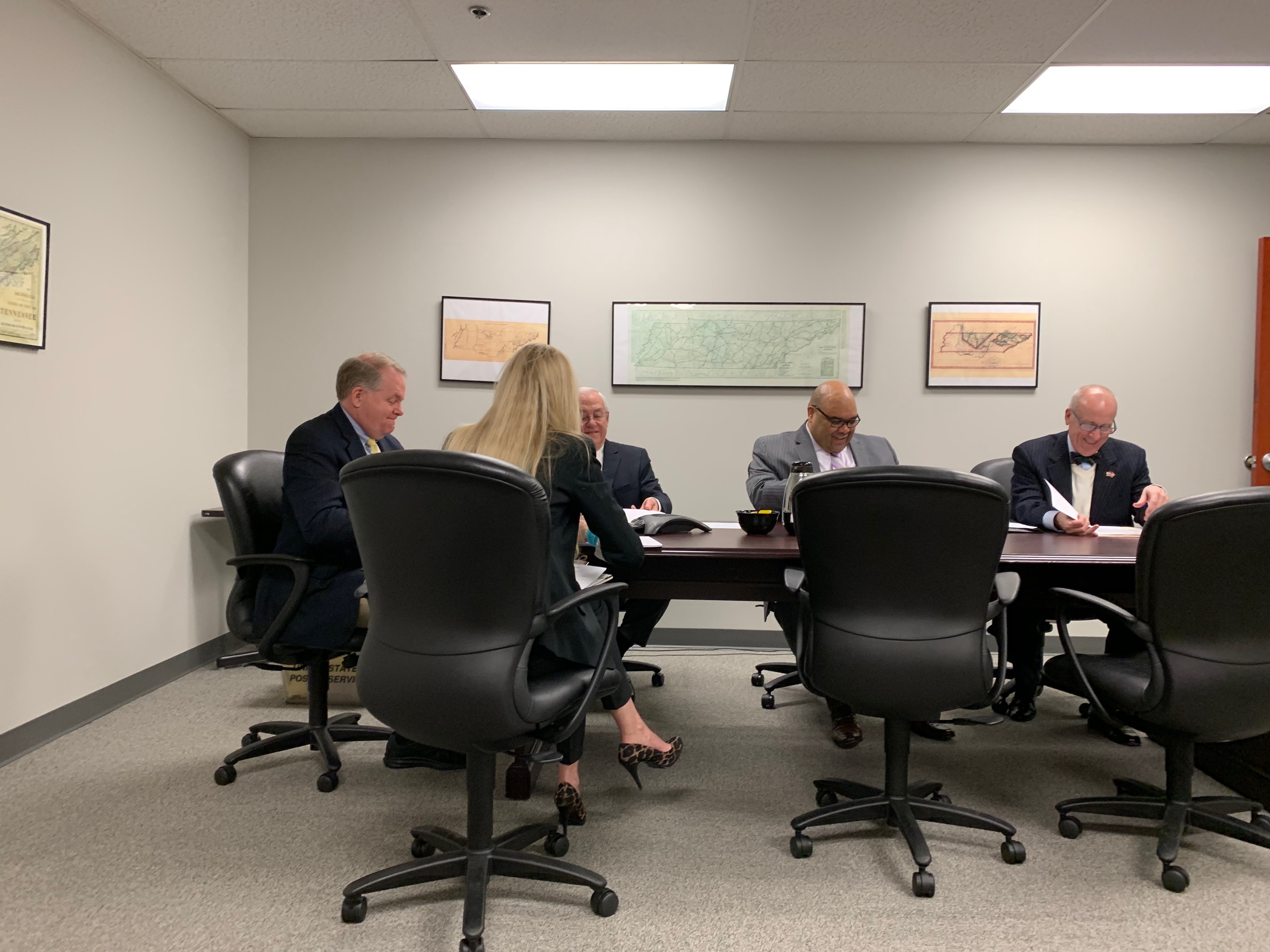 JB
JB
Members of the Registry Board at work
The members of the Tennessee State Election Registry board are a chatty bunch, and their meetings often dissolve (superficially at least) into a gag-fest of sorts — as did the one on Wednesday, March 13, held to consider penalties for violators of financial disclosure requirements for political candidates.
Republican member Tom Lawless of Nashville inquired when the name of Memphis state Representative Joe Towns came up, “Have we ever not had Joe?”
(It is a reliable staple of Tennessee political news that at any given time Towns either a) is delinquent on his financial disclosures; or b) is having a significant fine (usually $10,000) levied on him for a fresh delinquency.
Former state Representative Henry Fincher, a Democrat, who was plugged into Wednesday’s Registry meeting by speakerphone from his Cookeville office, joked that Towns would be showing up a some point with “bags of cash.”
Lawless topped that with a jest that the Memphis Democrat — a frequent offender on the Registry’s books, as the conversation suggested — might “break the Democratic caucus.”
Getting down to the sober side of the matter, Drew Rawlins, the executive director of the Registry, noted that no disclosures had been filed by Towns since the first quarter of 2018.
A few more jokes were passed, including Fincher’s suggestion, greeted by appreciative chuckles, that if Rawlins should retire, Towns would be the appropriate replacement, given his unparalleled experience with the Registry.
And finally, getting down to business, the Registry’s four members — besides Lawless and Fincher, they were William (Paz) Haines of Nashville, a Democratic appointee, and Tom Morton of Bristol, a Republican appointee — agreed to assess Towns with a $10,000 civil penalty, yet another in a series of big-ticket sums levied on him over the years. Towns has somehow been able to pay his fines (just how remains one of the legislature’s mysteries), or he would not have been able to run successively for reelection, as he has.
The four members of the Registry board (six is the required number, but at present there are two vacancies) must alway concur on a decision, or it cannot be enforced. This is one explanation for the group’s obvious camaraderie. One way or another, they find the common denominator, and this — as much as any native bonhomie — explains the more or less nonstop banter.
They always find a way to agree on a solution, or, if not, on an agreement to defer the issue.
There was no dissent, for example, on the matter of how to handle the case of former Nashville state Senator Thelma Harper, who retired without turning in her final disclosures. She has had some health problems, Rawlins explained, and her daughter is now doing what she can to take care of her mother’s affairs. The Registry board members expressed the requisite sympathy, seemingly sincerely, and voted to take no action.
Even more obvious was their burst of compassion for a delinquent candidate, a loser in his election, who is apparently suffering from late-stage cancer. “Leave him alone. The poor man already has too much to worry about,” suggested a visibly moved Lawless, and the others concurred.
On the other hand, Lawless, the source of much of the nonstop bonhomie, can come down hard on offenders — “deadbeats,” he referred to them frankly — who owe disclosures and are contemptuous about complying with the Registry or, worse, make promises of compliance and then disregard them. The others tend to agree on such persons, who tend to draw the maximum fines.
One of the more vexing cases on Wednesday was that of another Memphis state representative, the irrepressible G.A. Hardaway, who answered a demand for a corrected disclosure recently by sending a substitute form, signed and dated correctly, but including no figures at all.
“He filed a piece of paper,” Rawlins summed it up.
After some genuine uncertainty about how to respond (“whatever we do will have to be nonpartisan,” Fincher said, by way of reminder), the group finally coalesced on a strategy of putting Hardaway on notice but scheduling a come-to-Jesus moment for him in June, well after the end of the current legislative session.
The bottom line of it all is that the Registry board members are dead serious about their duties and hard on scofflaws but ever willing to cut some slack to offenders willing to offer compliance. Or thought to be, with proper encouragement. It didn’t hurt Hardaway’s predicament that he is regarded fondly by several of the members, was well-acquainted with Lawless, and had been a suite-mate of Fincher’s during the latter’s legislative days.
The human element is, for better or for worse, always in evidence at a meeting of the Registry board.